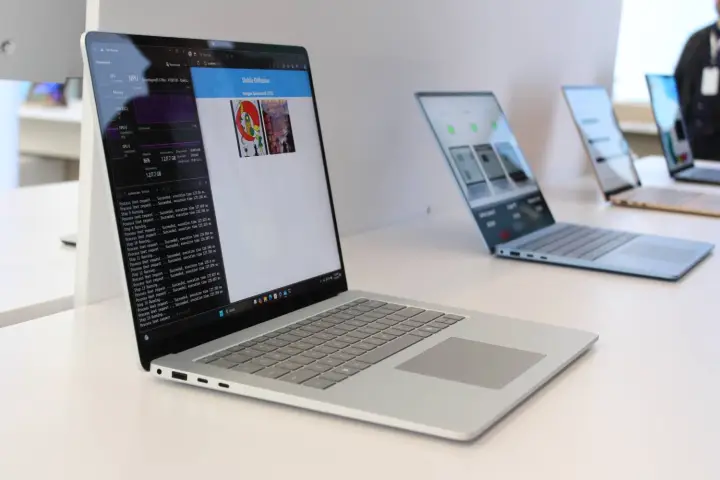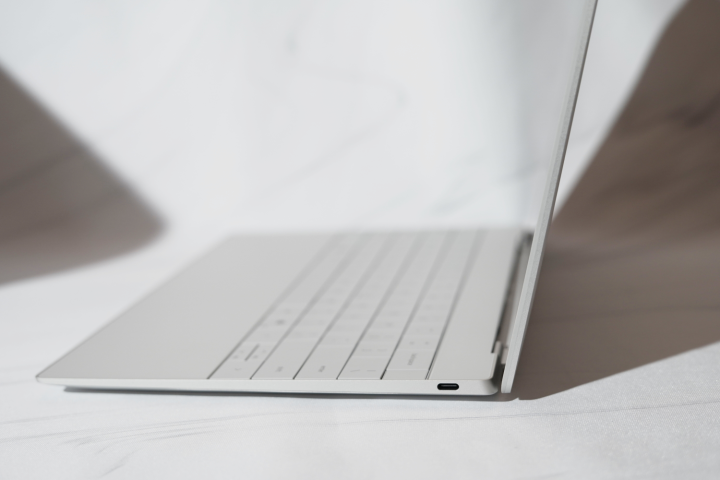
Copilot+ PCs represent a new era for Windows. Microsoft’s implementation of AI is key to these new devices, of course, but so is the transition to Arm. Although Copilot+ isn’t limited to Qualcomm’s Arm chips, right now they have exclusivity because of the required 40 Tera Operations Per Second (TOPS) performance of the neutral processing unit (NPU) in these devices.
That means these new laptops are thin, powerful, and have fantastic battery life — a fantastic antidote to the MacBook Air. Though we haven’t reviewed any in-depth yet, here are our favorites from among the ones we’ve seen in person so far.
Microsoft Surface Laptop

The Surface Laptop was always supposed to be a true competitor to the MacBook Air. The design was sleek, and it’s always been quite thin. However, it always struggled with two particular problems: performance and battery life. As a Copilot+ PC with the Snapdragon X chips under the hood, though, the latest Surface Laptop easily jumps these hurdles. All of a sudden, it looks like it finally has the chance to live up to its potential.
For the first time in many years, Microsoft also took the opportunity to introduce some tweaks to the aesthetic. It has thinner bezels, a larger haptic feedback trackpad, and some new color options. All that is to say that the new Surface Laptop is the Copilot+ PC I’m most eager to spend more time with. The Copilot+ program belongs to Microsoft, so I anticipate the Surface to be the flagship option. Add in a starting price of $999, and you have a really solid value.
Though this list is focused on laptops, I should mention the new Surface Pro too. The 2-in-1 remains a unique device, but it will hopefully inspire a new generation of Windows tablets and detachable 2-in-1s thanks to the vast improvement in performance and battery life. I’m particularly excited for that gorgeous OLED screen, which looks fantastic.
Samsung Galaxy Book4 Edge

Samsung is known for making ultrathin laptops, and the two Copilot+ models take things even further. At 0.43 inches thick, they’re thinner even than a MacBook Air. Key to this, of course, is the Arm chip inside, which allows for such extreme efficiency without sacrificing performance. The size alone makes it one of the devices I’m most excited to test out on this list.
Samsung is bringing two size options to the table: 14-inch and 16-inch. Both are exceedingly thin and come with an AMOLED screen, though the 16-inch model has a couple of extra features, such as an HDMI port, an even larger touchpad, and some larger storage configurations.
Samsung is also introducing a new feature that connects its products together. Copilot on your PC will be able to connect directly to Phone Link and run tasks on your Samsung phone or tablet.
There are some Samsung-isms here that I don’t prefer, whether that’s the large bottom bezel or number pad (in the 16-inch model), but the Galaxy Book4 Edge represents just how thin these devices can get.
The 14-inch model starts at $1,350, while the 16-inch model starts at $1,450.
Dell XPS 13 (9345)

The Copilot+ version of the XPS 13 looks identical to the current Intel offering that’s available, model number 9340. As much as a new design would have been appreciated, Dell already has something fairly cutting edge with the current version of the XPS 13. The new design isn’t beloved by all — in fact, it’s rather controversial. The seamless glass trackpad invisibly blends into the palm rests, making for an incredibly modern, minimalist aesthetic. The capacitive touch buttons that replace the function row of keys are perhaps the most derided aspect of the design, as is the lack of a headphone jack.
But if you can get past those quirks, the XPS 13 should really come alive with the Snapdragon X Elite on deck. There’s no laptop as premium and forward-thinking as the XPS 13, and this new, powerful Arm chip inside ensures that its performance and battery life are up to par against the M3 MacBook Air. So, what’s exciting about the XPS 13 9345 is that we’re finally getting the most premium Windows laptops on Arm. That really says something about the confidence in these new chips and Microsoft’s ability to support them. It’s currently selling for just $50 more than the Intel version. Based on the performance and battery life claims, I can’t imagine why you’d still opt for Intel’s.
The Dell XPS 13 will start at $1,300, and come with a Snapdragon X Elite, 16GB of RAM, and 512GB of storage.
HP OmniBook X 14

HP took the exact opposite approach of Dell by seizing the chance to rebrand its entire line of laptops. Gone are the familiar Spectre and Envy brands — now replaced by Omni. The top-of-the-line device so far is the OmniBook X 14, a Copilot+ PC with a pretty stark new look. There’s no question that HP is gunning for the MacBook aesthetic here, but the OmniBook X 14 definitely has its own vibe, especially with the all-white model.
The chassis looks incredibly thin, and the soft, rounded edges are appealing. The design language of the keyboard and colored accents along the function row keys make this one stand out — both from HP’s previous laptops and the other Copilot+ options.
The OmniBook X 14 will start at $1,150 for a Snapdragon X Elite configuration with 16GB of RAM and 512GB of storage.
Lenovo Yoga Slim 7x

One of the promises of improved CPU efficiency is the ability to have thinner laptops. The Lenovo Yoga Slim 7x is one of the thinnest laptops of the bunch, coming in at 0.5 inches thick and weighing less than 3 pounds. It also features a 14.5-inch OLED screen, a quad-speaker sound system (with upward-firing tweeters), and a large touchpad.
It otherwise bares a stronger resemblance to other Lenovo Yoga laptops, only smaller, more powerful, and much longer-lasting. Setting aside the AI features, that’s the biggest strength of the Copilot+ platform. All in all, these are just much better all-around laptops than what has come before in this class of Windows laptop.
The best part? This is only the beginning. If this all ends up being a successful operation, hopefully we’ll see more inventive designs that push the limits of what’s possible when devices are built around these efficient chips.


